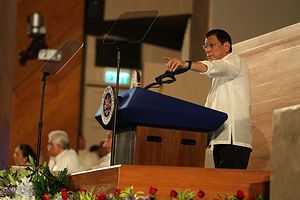Philippine President Rodrigo Duterte sought to realign his ideological flow with Russian President Vladimir Putin during his landmark visit to Moscow on May 22, bringing with him a high-profile Cabinet contingent. But in the end he cut short the meeting and declared martial law in the southern Philippines.
The firebrand leader’s urgent return to Manila paid forward as the military launched a surgical strike against high-value bandits belonging to the Maute Group and the Abu Sayyaf Group.
But since the declaration of martial law, public debate has reached a new frenzy, as victims of the past martial law sounded the need for vigilance bounded by legal instruments under the president’s accountability.
What does the imposition of martial law in the southern Philippines mean for Duterte’s promise to create federal states in the near future? Would increased autonomy for states increase the odds of separation from the republic if mishandled secessionism and rebellion combine to wound the country’s national sovereignty and integrity?
There are two systems being scrutinized for the Philippines: the unitary system and the federal system. Both has pros and cons. The first side favors highly centralized powers in the national government while the second option disperses the delegation of powers to the various regions.
Federalism offers a political system with self-rule for regions and shared rule for all embodying two orders of government, regional governments and a central government functioning with different responsibilities within which they are autonomous. The basic principles of federalism cement power-sharing, resource-sharing, respect-for-all, and development-for-all.
Federalism rose to public consciousness again when Duterte won the presidency, after having pledged to support a federal system. In December last year, he urged Congress to hastily put in place a federal system of government, believing that this was the key to bring peace in discordant Mindanao.
While Duterte’s trust rating remains high, he wishes to keep his promise to the myriad Muslims, Christians, and indigenous peoples in the southern Philippines. He has called on Congress to enact a law for the election of delegates to the Constitutional Convention, while at the same time holding simultaneous peace talks with the militant groups that should end by 2018.
If the system goes well, a plebiscite will have to happen by 2019. If approved, the road to federalism will be implemented starting in 2019 with the first election of the first set of officials of the various states and federal government in 2022.
Debates over a shift to federalism in the Philippines are as old as its history as an independent nation. However, the recollections of political hybridity and cultural diversity inflame rhetorical questions about how to unite the divided country and better serve the Filipino people with a new platform of government.
The archipelagic nation-state suffers enough pain with experimental and failed peace processes caused by protracted mistrust and distrust between and among secessionists, rebels, militant groups, and terrorists, added to the long formations of political dynasties, private armies, and criminals. Peacemakers in Mindanao must prepare for the most difficult part of the peace process implementation — DDR (disarmament, decommissioning and reintegration), which stakeholders have not yet achieved. Asymmetries in the peace process have made it tricky to find a perfect formula that works in the government’s favor.
To secure Philippine sovereignty, a shift to federalism must coincide with defense reforms. The legislative agenda must include updating the archaic National Defense Act of 1935 to mainstream changes in current national defense policies, principles, and concepts. The new NDA must be in sync with the National Security Act, which provides for a national security policy by institutionalizing planning process within national development planning.
Though still debatable, federalism’s promises could brighten the Philippines’ chances to improve democracy, bringing governance closer to the citizens by empowering local communities in a way that recognizes democratic accountability and horizontal separation of power. It might improve good governance by addressing local diversity and regional varieties in policies. Finally, federalism would manage diversity by giving territory-based communities a degree of autonomy to manage their own affairs.
Chester Cabalza, Ph.D., is an Associate Professor at the National Defense College of the Philippines and a Senior Lecturer at the University of the Philippines Diliman. The views of the author are his and do not represent his organizational affiliations.

































